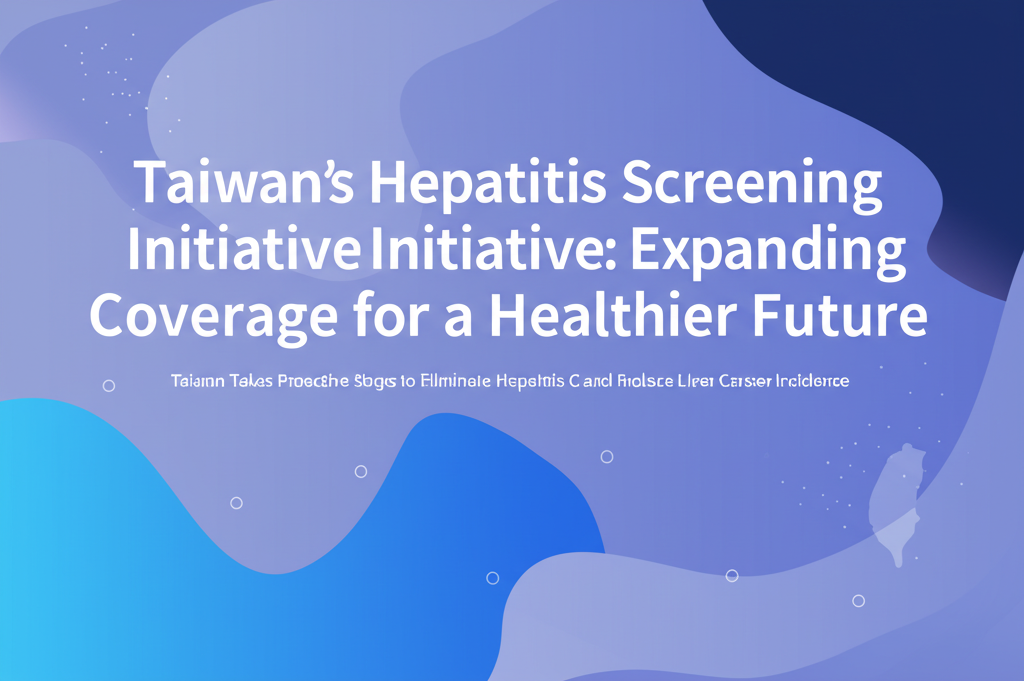Taiwan's Hepatitis Screening Initiative: Expanding Coverage for a Healthier Future
Taiwan Takes Proactive Steps to Eliminate Hepatitis C and Reduce Liver Cancer Incidence

In a significant move to combat hepatitis B and C, the Health Promotion Administration (HPA) in Taiwan is poised to expand the eligibility for its government-funded screening program. According to HPA Director-General Wu Chao-chun (吳昭軍), the initiative aims to include individuals aged 40 and older, with a target launch date of July.
This expansion aligns with global efforts, although Taiwan is not a member, to eliminate hepatitis C as a public health threat, with the World Health Organization (WHO) setting a target of 2030. Taiwan has been actively working towards this goal.
Building on the 2020 expansion that offered a one-time screening for adults aged 45 to 79 and Indigenous people aged 40 to 79, the HPA is further extending its reach. Last year, the HPA increased the screening payment subsidy to NT$370 (US$11.31) to encourage healthcare facilities to provide the service, also offering rewards for referrals for follow-up examination and treatment.
As of last month, over 7 million people have benefited from the screening program, contributing to a decline in liver cancer incidence across Taiwan. In 2022, the liver cancer incidence rate was 23.7 percent, lower than those of breast cancer, lung cancer, prostate cancer, and colorectal cancer, as per Taiwan Cancer Registry data.
Wu Chao-chun emphasized Taiwan's strong progress in eliminating hepatitis C, with the HPA aiming to achieve this milestone this year. The HPA plans to send documents to an international organization to apply for hepatitis C elimination certification. Taiwan is known for being the first country to carry out universal hepatitis B vaccination of newborns.
Liver cancer has long been a leading cause of cancer deaths in Taiwan, with approximately 80 percent of cases linked to hepatitis B or C. Recognizing that individuals born before 1986 were often not vaccinated against hepatitis B, the HPA plans to extend screening to this group before they reach 45, emphasizing the importance of early detection for improved treatment and outcomes.
The expanded program seeks to encourage unvaccinated individuals and those nearing 40 to get tested promptly, as waiting until 45 might be too late. The HPA has allocated a budget of NT$300 million for this initiative, anticipating that it will benefit over 1 million people. The government agencies are working to finalize the administrative procedures, with the goal of launching the expanded program in July.
Other Versions
Iniciativa de Taiwán para el cribado de la hepatitis: Ampliar la cobertura para un futuro más sano
Initiative de dépistage de l'hépatite à Taiwan : Élargir la couverture pour un avenir plus sain
Inisiatif Skrining Hepatitis Taiwan: Memperluas Cakupan untuk Masa Depan yang Lebih Sehat
Iniziativa di screening dell'epatite a Taiwan: Ampliare la copertura per un futuro più sano
台湾の肝炎検診イニシアチブ:より健康な未来のための保険適用拡大
대만의 간염 검진 이니셔티브: 더 건강한 미래를 위한 검사 범위 확대
Inisyatiba sa Pagsusuri ng Hepatitis sa Taiwan: Pagpapalawak ng Saklaw para sa Mas Malusog na Kinabukasan
Инициатива Тайваня по скринингу гепатита: Расширение охвата для более здорового будущего
โครงการตรวจคัดกรองไวรัสตับอักเสบของไต้หวัน: ขยายขอบเขตการเข้าถึงเพื่ออนาคตสุขภาพที่ดีข�
Sáng kiến Sàng lọc Viêm gan của Đài Loan: Mở rộng Phạm vi cho một Tương lai Khỏe mạnh hơn
